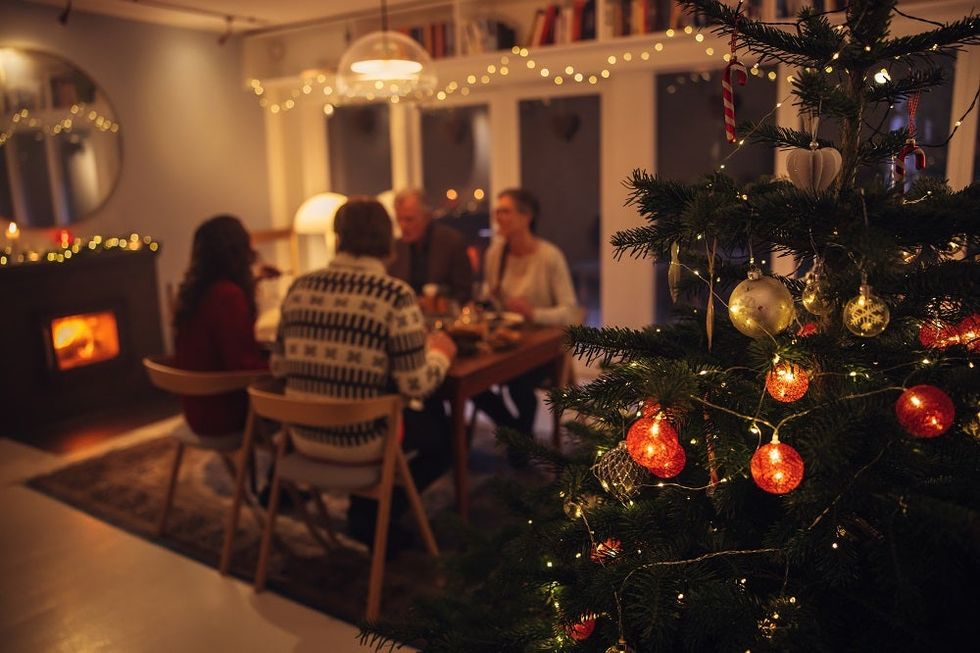Christmas is famously heralded as the most wonderful time of the year, but some beg to differ.
Those who grumble about the holidays are typically met with comparisons to the Grinch or Scrooge, but there are myriad reasons people would rather step back during the tinsel-infested month of December.
Some simply find the consumerism sickening, the cheeriness superficial, and the concept of Santa a little disconcerting (a strange man who observes and judges us? A wee bit Orwellian. Not to mention he breaks into our houses annually).
Beyond the lighthearted “bah humbugging” we all occasionally indulge in at this time of year, the 25th of December can be one of the most difficult dates on the calendar for some. Feelings of isolation amplify. Simmering family tensions come into sharp focus. The dire financial straits. A pressure to put up a “merry and bright” facade. For some, there’s the heartbreak of having an empty chair at the dinner table.
As many as one in seven Brits admitted disliking the holiday in 2019, with a further three in ten saying they’re feeling stressed about Christmas this year.
To discover the why behind the statistics, we spoke to four people who dislike the holidays to find out more.
Sign up to our new free Indy100 weekly newsletter
“We should abolish Christmas, and instead everyone should be issued with a second birthday”
Brighton-based Guy Smith reckons we should abandon the holiday altogether, and instead celebrate “second” birthdays six months after our real ones.
The 43-year-old said although the act of gift-giving can be a nice element, it’s also unsustainable.
“I really hate Christmas,” Guy said.
“I just don’t understand why we need to have a specific day where we give people presents. Giving gifts to loved ones is a wonderful thing, but having a specific day where everyone exchanges gifts removes the thoughtfulness from the process, and just ends up with everyone rushing to give out presents which are often unwanted, only to receive the same in return. This creates so much waste, and is so unsustainable,” he said.
Guy admitted that he will still celebrate Christmas due to “social pressure”, but with his “regular lack of enthusiasm”.
He said: “I think we should abolish Christmas, and instead everyone should be issued with a second birthday, six months apart from their real one. That way everyone would get the same amount of presents, but the gift-givers will be able to focus on one person at a time, leading to more thoughtful, better-received gifts, and therefore less waste.
Guy, the director of energy efficiency survey company Easy EPC, laughed: “My work gives everyone avatars in their email footers, and for some reason they have made mine into the Grinch. I can’t imagine why!”
“I find it fake”
Krista Krumina cited the pressure posed by family as one of her main reasons for disliking the season.
Latvia-based Krista said: “I hate Christmas because I find it fake. I’m still often forced to celebrate Christmas with my family, but whenever possible, I try to escape that by travelling somewhere.”
The 34-year-old said her family isn’t that close and added: “We don’t communicate much, but then there’s Christmas and we’re that ‘big, happy family’. I hate this part of Christmas.”
Krista, a co-founder of Truesix, said her best Christmas so far was when she and her husband jetted off to Bali together.

“I wish the celebration of Jesus’ birth was not so tied into a shallow, commercial festival”
Symon Hill, an author, tutor and campaigner living in Oxford said that although he doesn’t hate Christmas, he does find it difficult.
The 44-year-old said that the commercialisation of Christmas contrasts with the true Christian meaning of the holiday.
He said: “As a Christian who hates capitalism, I wish the celebration of Jesus’ birth was not so tied into a shallow, commercial festival in which we’re all tricked and exploited into waste and consumerism to make more money for the super-rich! It’s the opposite of Jesus’ example of compassion, sharing and resistance to injustice. I therefore always have very conflicted feelings on Christmas day.”
He added: “On a practical level, Christmas has been much harder since my parents died, this will be my second Christmas without either of them. I’ll spend a couple of days with a good friend over Christmas, which will be relaxing in many ways, but I’ll still be struggling.”
Symon said he doesn’t want to undermine anyone else’s enjoyment of Christmas, but added that we should acknowledge that the pressure to celebrate at this time of the year can exacerbate the pain of those who are bereaved, lonely, depressed or otherwise struggling.
“My depression often gets worse because there is this perceived pressure to be ‘merry’ all month”
Fiona Thomas from Glasgow said that she has found the festive season triggering since suffering a mental breakdown in 2012.
The 34-year-old said: “The social anxiety of being around more people and in crowded places is upsetting, and my depression often gets worse because there is this perceived pressure to be ‘merry’ all month! I recently got sober so there’s that angle too.”
Instead, Fiona, who runs online courses and events for writers, organises her work schedule in a way that allows her to instead focus on prioritising self-care. She also keeps socialising to a minimum.
This year she will spend the day itself with her in-laws in Wales.
The Amazon bestselling author shared a few tips for people who also find this time of year triggering.
She suggested people find and prioritise parts of the season they do enjoy. For Fiona, this means walks in the winter sun, but for others, it could mean baking or watching films.
Looking ahead and planning your time is also important, paying particular attention to days you anticipate being difficult. She said: “For me, this means minimal socialising the day before and time to do something relaxing like reading or journaling. It also means a day or morning in bed afterwards to recover and catch up on sleep.”

However you’re spending the 25th of December, we hope you have a peaceful day.














